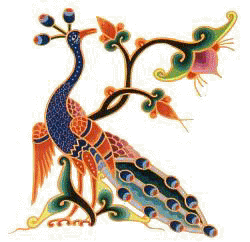|
HINDUISM HISTORY
Hinduism is the only pagan religion
that is recognized as one of the 12
great religions of the world. According
to most theology scholars Hinduism was
founded about 7,000 years ago in the
year 5,000 B.C. It spread across India
and then to the rest of Asia. Even
though some Asian countries later made
Islam or Buddhism their state religion,
Hinduism is still the major religion of
the people of India. Colorful roadside
shrines and the tinkling of temple bells
in Asia are constant reminders of
Hinduism.
Hinduism is unique among the world religions in that it
has no founder or date of origin. While most major religions
derive from new ideas taught by a charismatic leader,
Hinduism is simply the religion of the people of India,
which has gradually developed over four thousand years. The
origins and authors of its sacred texts are largely unknown.
The first Hindu teachers were called Brahmins. They
passed down the teachings of Hinduism through oral stories
at first. Later, the stories became the Rig-Veda,
which was written down in 1,500 B.C. These teachings may
have come from a people called the Aryans whose language may
have been the predecessor of Sanskrit.
|

WORLD RELIGIONS
COMPARED
WORLD
RELIGIONS CLIPART
WORLD
RELIGIONS HOME
HINDUISM HOME |
The Aryans were nomadic warriors who dominated
northern India between 3,000 and 1,500 B.C. Later, they
moved down into southern India where they met powerful local
tribes. We don't know a lot about the Aryans because they
left no cities behind for archaeologists to study. These
nomads finally settled near the Ganges River around 400 B.C.
In the centuries before the birth of Christ, a
mysterious author/authors wrote two important Hindu scriptures, the
Ramayana and the Mahabharata. Both of these epic poems
tell stories involving kings and conflicts. They convey many truths
in an entrancing, poetic form.
During these centuries, India was divided into
kingdoms that were ruled by rich princes.
A certain order of society in India was firmly established. This
became known as the caste system, and it was based on another
ancient Hindu text called the Bhagavad-Gita. The legend said
that out of the mouth of a god came the scholars and priests. Rulers
and warriors came from the god's arms. From the god's thighs came
the merchants and farmers. The servants and laborers came from the
god's feet. A last group, called the "untouchables," performed some
of the most menial labor in society, such as cleaning bathrooms and
sweeping the streets.
Although today's Hinduism differs significantly from earlier forms
of Indian religion, Hinduism's roots date back as far as 2000 BC,
making it one of the oldest surviving religions. Because of its
great age, the early history of Hinduism is unclear. The most
ancient writings have yet to be deciphered, so for the earliest
periods scholars must rely on educated guesses based on archaeology
and the study of contemporary texts.
HINDU TIMELINE:
 |
3,000–1500 BCE: Indus Valley Civilization (Old Chronology)
|
 |
6,000–1900 BCE: Indus-Sarasvati Civilization (New
Chronology)
|
 |
1500–500 BCE: Vedic Period (some say, beginning with the
Aryan migration
|
 |
500 BCE–500 CE: Epic, Puranic and Classical Ages
|
 |
500 CE–1200 CE: Early and Middle Medieval Period
Early development of bhakti (esp. in South India).
Formation of sampradayas contesting internally and
externally
Theological establishment of Vedanta.
|
 |
1200–1757 CE: Muslim Period
Bhakti saints and the cultivation of personal piety
Development of the theistic traditions
|
 |
1757–1947 CE: British Period
The reform movements and birth of neo-Hinduism
|
 |
1947 CE–present: Independent India
Migration to Britain
Hinduism established as a world religion.
|
It is far easier to conquer
others than to conquer oneself,
because the former can be attained by recourse to outside means,
while the latter can be achieved only with one's own mind.
Mahatma Gandhi (1869-1948)
